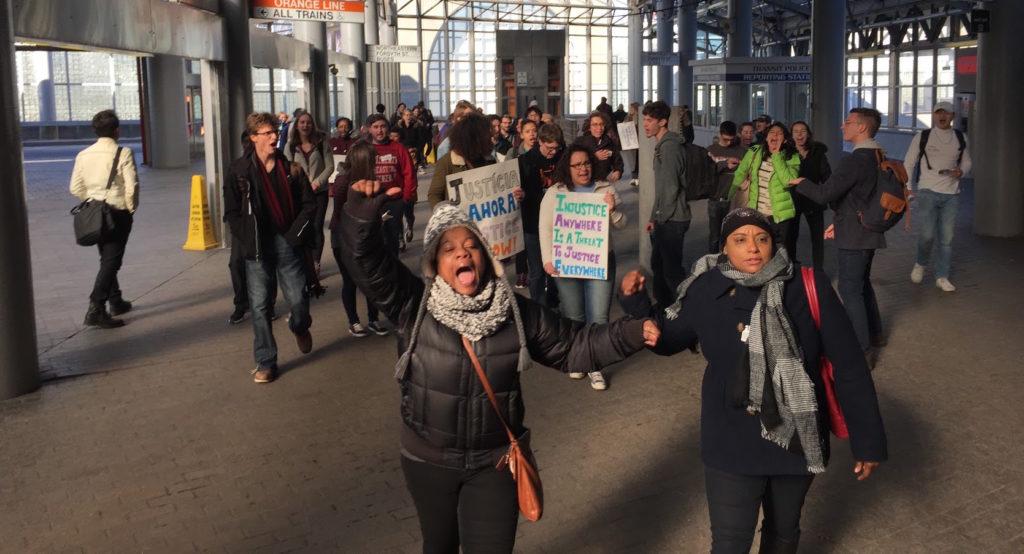Editorial: Dreamers need their lawmakers’ support
September 21, 2017
In the days after President Donald J. Trump announced that his administration would be repealing The Deferred Action for Childhood Arrivals (DACA) program, Boston residents planned a rally to demand protections for immigrants who came to the United States as children. With chants of “No hate. No fear. Immigrants are welcome here,” and “The people united will never be defeated,” these marchers showed their active support of DACA recipients— something the Boston government has yet to fully embrace.
Boston has taken on the title of a sanctuary city and in doing so has told the nation that it is ready and willing to protect all of its residents, whether they are documented or not. The fact that Boston is on the short list of cities who embrace the label of sanctuary city is admirable. However, supporting and protecting immigrants in the city cannot happen with a single action and will not occur in isolation. The status of undocumented immigrants throughout the country is precarious and for many the future seems bleak. The best way for Boston to uphold its status as a defender of all would be to revisit legislation regarding the rights of undocumented immigrants and give undocumented residents peace of mind through legal protections.
Lawmakers across the country have publicly stated that their cities, towns and states are sanctuaries to documented and undocumented immigrants. However, some have taken that promise further by discussing plans and creating bills to protect their immigrant communities. California governor Jerry Brown and lawmakers from the state recently announced a plan to set aside $30 million to help immigrants who will be affected by Trump’s decision to repeal the DACA program, which allows undocumented immigrants who came to the United States as children to apply for temporary protections from deportation and to receive work permits. $20 million would be used for immigration legal services and $10 million would be given to public colleges and universities to offer financial aid to students protected by DACA.
Ultimately, California passed SB 54 that is commonly referred to as the “California Values Act.” Despite being scaled back from its original form, it is currently the most extensive immigrant protection bill in the country and limits communication between state and local law enforcement and federal immigration authorities. It also prevents officers from questioning and holding people because of immigration violations and requires the California Department of Corrections and Rehabilitation to develop new standards to protect people being held on immigration violations. It also encourages rehabilitation and educational programs as supplements to the sentences of immigrant inmates.
Boston has not been completely idle in offering protections to its immigrant community. The 2014 Trust Act states that police cannot detain people based on immigration status. Mayor Martin J. Walsh created the Office for Immigrant Advancement to “facilitate full and equal participation in all aspects of life by immigrants in Boston.” These were important steps and continue to help immigrants in Boston, however these laws should be adapting and changing to offer the proper protections for the threats at hand. Threats against immigrants in this country are greater now than they were when the 2014 Trust Act was first passed and there must be updates to reflect that.
Boston needs to send a clear message that it rejects the Trump administration’s decision to end the DACA program by working with immigration advocacy groups to create a comprehensive plan to support DACA recipients.
As a city with such a high concentration of colleges and universities, the DACA repeal hits especially hard because there are DACA recipients who currently study at some of Boston’s universities. Funding to guarantee financial aid to these students would be a great show of support for those students.
Beyond that, Boston should be limit communication between its local police and federal immigration officers when an immigrant isn’t being held for certain criminal offenses, as California did. Boston can go one step further by examining offenses that would warrant communication with federal officers and removing some of the nonviolent charges that often walk the line between felonies and misdemeanors.
Walsh has made it a point to state that DACA recipients “belong to our communities.” It is time this community backed those words with concrete action to keep the DACA recipients and immigrants in our community safe, secure and reassured.
Photo by Glenn Billman







